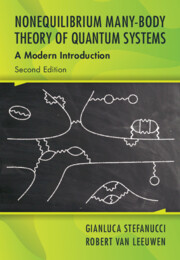Book contents
- Frontmatter
- Dedication
- Contents
- Preface to the Second Edition
- Preface to the First Edition
- Abbreviations and Acronyms
- Fundamental Constants and Basic Relations
- 1 Second Quantization
- 2 Getting Familiar with Second Quantization: Model Hamiltonians
- 3 Time-Dependent Problems and Equations of Motion
- 4 The Contour Idea
- 5 Nonequilibrium Green’s Functions
- 6 One-Particle Green’s Function: Exact Results
- 7 One-Particle Green’s Function: Diagrammatic Expansion
- 8 Hartree–Fock Approximation
- 9 Kadanoff–Baym Equations
- 10 Self-Energy and Screened Interaction: Exact Results
- 11 Grand Potential: Diagrammatic Expansion and Variational Forms
- 12 Conserving Approximations
- 13 Linear Response Theory
- 14 Two-Particle Green’s Function: Diagrammatic Expansion
- 15 Electron Gas: Equilibrium and Nonequilibrium Correlation Effects
- 16 Green’s Functions for Nonequilibrium Fermion–Boson Systems
- 17 From Green’s Functions to Simplified Many-Body Approaches
- Appendix A: From the N Roots of 1 to the Dirac δ-Function
- Appendix B: Graphical Approach to Permanents and Determinants
- Appendix C: Green’s Functions and Lattice Symmetry
- Appendix D: Thermodynamics and Quantum Statistical Mechanics
- Appendix E: Density Matrices and Pair Correlation Function
- Appendix F: Asymptotic Expansions
- Appendix G: BBGKY Hierarchy
- Appendix H: From δ-like Peaks to Continuous Spectral Functions
- Appendix I: Fermi Golden Rule and Shortcomings of Linear Response Theory
- Appendix J: How to Solve the Kadanoff–Baym Equations in Practice
- Appendix K: Time-Dependent Landauer–Büttiker Formula
- Appendix L: Virial Theorem for Conserving Approximations
- Appendix M: Lippmann–Schwinger Equation and Cross Section
- Appendix N: Hedin Equations from a Generating Functional
- Appendix O: Why the Name Random Phase Approximation?
- Appendix P: Kramers–Kronig Relations
- References
- Index
4 - The Contour Idea
Published online by Cambridge University Press: 02 January 2025
- Frontmatter
- Dedication
- Contents
- Preface to the Second Edition
- Preface to the First Edition
- Abbreviations and Acronyms
- Fundamental Constants and Basic Relations
- 1 Second Quantization
- 2 Getting Familiar with Second Quantization: Model Hamiltonians
- 3 Time-Dependent Problems and Equations of Motion
- 4 The Contour Idea
- 5 Nonequilibrium Green’s Functions
- 6 One-Particle Green’s Function: Exact Results
- 7 One-Particle Green’s Function: Diagrammatic Expansion
- 8 Hartree–Fock Approximation
- 9 Kadanoff–Baym Equations
- 10 Self-Energy and Screened Interaction: Exact Results
- 11 Grand Potential: Diagrammatic Expansion and Variational Forms
- 12 Conserving Approximations
- 13 Linear Response Theory
- 14 Two-Particle Green’s Function: Diagrammatic Expansion
- 15 Electron Gas: Equilibrium and Nonequilibrium Correlation Effects
- 16 Green’s Functions for Nonequilibrium Fermion–Boson Systems
- 17 From Green’s Functions to Simplified Many-Body Approaches
- Appendix A: From the N Roots of 1 to the Dirac δ-Function
- Appendix B: Graphical Approach to Permanents and Determinants
- Appendix C: Green’s Functions and Lattice Symmetry
- Appendix D: Thermodynamics and Quantum Statistical Mechanics
- Appendix E: Density Matrices and Pair Correlation Function
- Appendix F: Asymptotic Expansions
- Appendix G: BBGKY Hierarchy
- Appendix H: From δ-like Peaks to Continuous Spectral Functions
- Appendix I: Fermi Golden Rule and Shortcomings of Linear Response Theory
- Appendix J: How to Solve the Kadanoff–Baym Equations in Practice
- Appendix K: Time-Dependent Landauer–Büttiker Formula
- Appendix L: Virial Theorem for Conserving Approximations
- Appendix M: Lippmann–Schwinger Equation and Cross Section
- Appendix N: Hedin Equations from a Generating Functional
- Appendix O: Why the Name Random Phase Approximation?
- Appendix P: Kramers–Kronig Relations
- References
- Index
Summary
The Green’s function method is among the most powerful and versatile formalisms in physics, and its nonequilibrium version has proved invaluable in many research fields. With entirely new chapters and updated example problems, the second edition of this popular text continues to provide an ideal introduction to nonequilibrium many-body quantum systems and ultrafast phenomena in modern science. Retaining the unique and self-contained style of the original, this new edition has been thoroughly revised to address interacting systems of fermions and bosons, simplified many-body approaches like the GKBA, the Bloch equations, and the Boltzmann equations, and the connection between Green’s functions and newly developed time-resolved spectroscopy techniques. Small gaps in the theory have been filled, and frequently overlooked subtleties have been systematically highlighted and clarified. With an abundance of illustrative examples, insightful discussions, and modern applications, this book remains the definitive guide for students and researchers alike.
- Type
- Chapter
- Information
- Nonequilibrium Many-Body Theory of Quantum SystemsA Modern Introduction, pp. 93 - 122Publisher: Cambridge University PressPrint publication year: 2025

